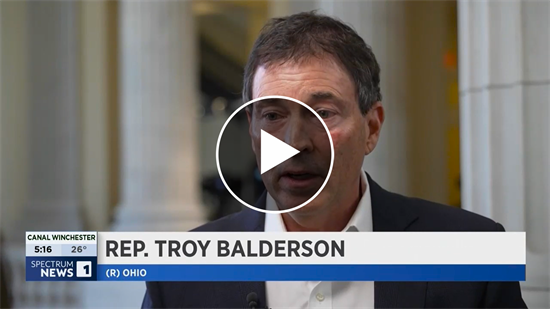This article was originally published by Spectrum News.
By Harri Leigh
WASHINGTON, D.C. — When President-elect Donald Trump takes office next month, Republicans in Congress see an opportunity to roll back some of President Joe Biden’s green energy and climate policies.
At last month’s United Nations Conference on Climate Change, Rep. Troy Balderson, R-Ohio, called for the “return of American energy leadership.” He said the solution lay beneath our feet—specifically in natural liquified gas (LNG) from the Utica and Marcellus Shales, parts of which stretch across his district east of Columbus.
“We have a very safe and efficient way to get base-load energy with natural gas," Balderson told Spectrum News. "In southeastern Ohio, we have over 100-year supply of natural gas, so let's use it.”
Though LNG is a fossil fuel that produces global warming emissions, Balderson argued it is a cleaner form of energy than oil or coal. During the shale boom from 2012 to 2022, Ohio produced 2,557% more LNG while reducing emissions 9%, according to data from the U.S. Energy Information Administration.
Balderson said more natural gas was also necessary to meet the nation’s growing demand for electricity, especially in the industrial sector.
“We need to make sure that we not only provide them with base-load energy but also we have, more importantly for our constituents, our homeowners, that their lights stay on, too,” he said.
As a member of the House Energy and Commerce Committee, Balderson is working to promote LNG production. He said he supported the Trump administration ending the Biden administration’s temporary pause on approving new terminals for exporting LNG, which came into effect in January.
“We want that ban to be lifted,” Balderson said. “We were really disappointed in that, and I think there's going to be a study coming out that will show the impact that it was, and how it impacted the LNG.”
Other Ohio Republicans have joined the effort, including Rep. Max Miller, R-Ohio, who chairs the House Space and Technology’s Energy Subcommittee, sent a letter this week to the Department of Energy demanding information on the agency’s actions leading up to the LNG pause.
Balderson also wants to cut red tape on new energy projects, which he pointed out applies to both fossil fuel and renewable energies.
“Under this administration we’ve made some really heavy regulation burdens,” he said. “Moving forward to the next administration, those are some of the things that we're going to want to redirect change, and look at all of those, and make sure that we make energy affordable for our constituents and our businesspeople."
To that end, Balderson introduced the GRID Power Act, which would fast track new power projects connecting to the electricity grid. Right now new power sources typically wait five years to connect, because of regulatory requirements, according to the Department of Energy’s Berkeley Lab.



